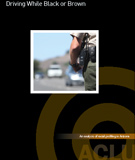4/22/2008
ACLU Report: Police Harass Motorists for Driving While BlackACLU of Arizona report claims black and Hispanic motorists are unfairly targeted by state troopers.

Driving while black, or DWB, is still a crime in Arizona according to a report released yesterday by the state branch of the American Civil Liberties Union. The charge is based upon a review of 200,000 traffic stops on interstate highways conducted between July 1, 2006 and June 30, 2007. The group had used a 2001 lawsuit against the Department of Public Safety (DPS) to force state troopers to collect racial data during traffic stops and to obtain written proof of consent to any search. Arizona ACLU Executive Director Alessandra Soler Meetze found the results of Monday's report disturbing.
"Searches being conducted by the majority of DPS officers continue to target minorities, despite the fact that people of color are less likely than whites to be transporting drugs, weapons or other illegal contraband," Meetze wrote. "The report also shows that minorities are detained for longer periods of time after being stopped by DPS officers."
When a state trooper pulled over a black or Hispanic motorist, there was a one out of ten chance that the stop would result in a search, the report said. Indians had a slightly higher 13 percent search rate, compared to a search rate of just 4 percent for white motorists.
Although Hispanics and Indians were searched more often, they were actually found to be carrying illegal items less often than whites, according to the report. Thirty-four percent of white stops result in contraband seizure compared to 22 percent of Hispanic and 26 percent of Indian stops. Black traffic stops yielded the highest hit rate of 38 percent.
The report blamed the war on drugs for the apparent discrepancy in the way ethnic groups were treated during traffic stops. Federal funding is used to entice police agencies into using pretextual traffic stops to search for narcotics.
"It is this so-called 'drug courier' profile that encourages officers to employ racial stereotypes as they engage in drug interdiction activities," the report explained.
The ACLU researchers noted that a November 2007 DPS analysis likewise concluded that minorities were far more likely to be stopped and hit with multiple traffic tickets. But DPS researchers insisted it was impossible to jump to a conclusion of racism among troopers from the data because other unmeasured factors could be involved.
"Until I can get into the mind of an officer, I cannot determine whether he or she is making stops based on race," Dr. Robin S. Engel wrote.
The ACLU report offered four recommendations to address the problem the group saw in the data. First, the ACLU urges a ban on the practice of searching motorists who are not suspected of any wrongdoing. It also recommended the establishment of a strong police oversight board and the installation of video cameras in all police cruisers. Finally, ACLU advocated state legislation mandating more extensive data collection and reporting on traffic stops.
"The ACLU believes, quite simply, that the practice of treating motorists differently based on their race or ethnicity is unconstitutional."


